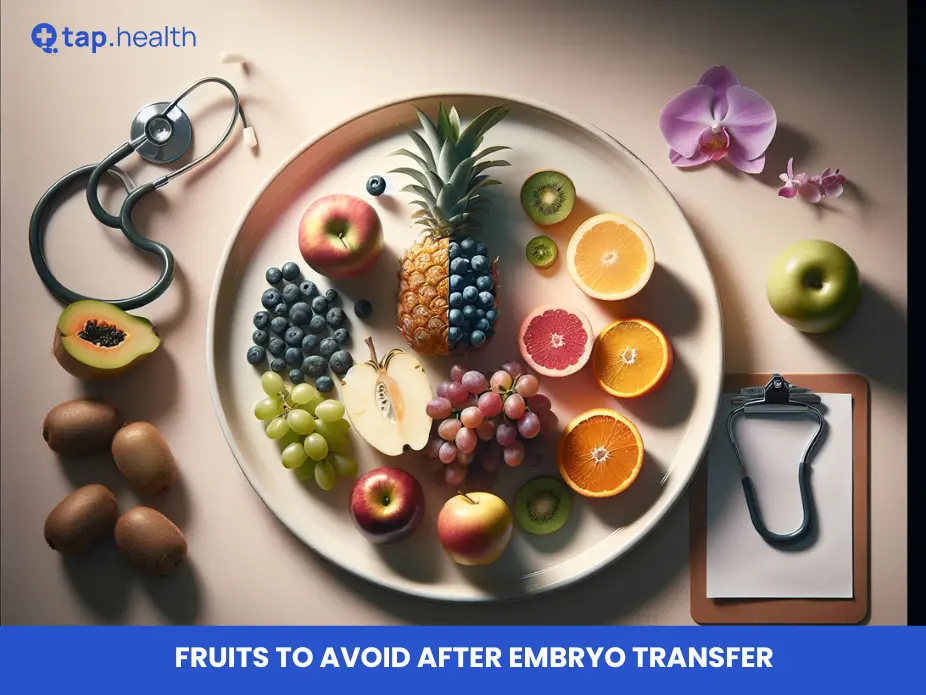Embryo transfer marks a crucial phase in IVF and assisted reproductive technology (ART), where embryos are placed into the uterus for implantation. Optimizing your IVF diet during this period can enhance success rates by supporting uterine health, hormone balance, and avoiding disruptions. Many wonder about specific foods impacting embryo implantation, especially fruits that could trigger uterine contractions or blood sugar spikes. This guide explores fruits to avoid after embryo transfer, backed by evidence on enzyme risks, mercury concerns, and safe alternatives for a fertility-friendly diet.
Understanding Embryo Transfer in IVF Cycles
Embryo transfer is the final IVF step, involving embryo placement in the uterus to foster implantation and early pregnancy. Success depends on embryo quality, uterine lining, and lifestyle factors like nutrition. A supportive IVF diet regulates hormones, improves egg quality, and creates an optimal environment for the embryo. Poor dietary choices, however, may hinder implantation by causing inflammation or contractions.
The Impact of Diet on Fertility and Implantation Success
Diet plays a key role in reproductive health, influencing fertility outcomes through nutrient intake. Essential vitamins, antioxidants, and fiber support progesterone levels and uterine receptivity. Conversely, certain fruits in an unbalanced fertility diet can introduce risks like enzyme-induced contractions or hormonal interference, potentially reducing IVF success. People often ask: “What foods affect embryo implantation?” Prioritizing a balanced intake avoids these pitfalls.
Key Fruits to Avoid After Embryo Transfer
Certain fruits pose risks post-embryo transfer due to bioactive compounds. Here’s a breakdown:
Pineapple and Bromelain Enzyme Risks
Pineapple contains bromelain, an enzyme in its core with blood-thinning properties. While some fertility myths suggest it aids implantation via anti-inflammatory effects, no studies confirm this. Instead, bromelain may cause uterine contractions or digestive issues like diarrhea, disrupting the sensitive post-transfer window. A 2015 study on rat uterus showed pineapple juice mimicking oxytocin effects, though human evidence is lacking. Avoid bingeing on pineapple before or after transfer to prevent discomfort.
Unripe Papaya: Latex and Papain Dangers
Unripe or semi-ripe papaya harbors latex and papain enzyme, potentially acting as an abortifacient by triggering early contractions. These compounds threaten embryo development, making raw papaya a fruit to strictly avoid in your IVF diet. Ripe papaya is safer but still consume sparingly.
Grapes and Resveratrol Interference
Black grapes, rich in resveratrol, may elevate body temperature and interfere with implantation processes. Fertility specialists advise moderation, as heat sensitivity affects embryo viability during early stages.
Citrus Fruits and Acid Reflux in Early Pregnancy
High-acidity citrus like oranges or lemons can worsen acid reflux or stomach irritation, common in early pregnancy. While not universally banned, those prone to digestive woes should limit intake to maintain comfort and support implantation.
(Note: High-mercury fish like swordfish or shark aren’t fruits but warrant avoidance due to toxicity impacting fetal development and fertility hormones. Opt for low-mercury options.)
Why Avoid These Fruits: Uterine Contractions and Enzyme Effects
Fruits to avoid stem from risks like uterine contractions. Unripe papaya’s papain and latex may provoke them, interfering with embryo attachment. Pineapple’s bromelain shares similar concerns, with potential blood-thinning effects in early pregnancy. Limited studies highlight enzyme disruptions, emphasizing caution in fertility diets.
Blood Sugar Spikes and High-Glycemic Fruits
Fruits causing rapid blood sugar rises, like overly ripe bananas, can imbalance hormones and thin uterine lining. High-glycemic foods reduce insulin sensitivity, lowering IVF pregnancy rates per recent studies. Monitor intake to stabilize levels for better implantation.
Mercury and Contaminant Concerns in Diet
Though not fruit-specific, mercury in certain seafood mimics broader contaminant risks. It crosses the placenta, harming development and fertility via hormonal disruption. Avoid to safeguard embryo health.
Acid Reflux and Digestive Comfort Post-Transfer
Acidic fruits exacerbate reflux, leading to discomfort that stresses the body during implantation. Prioritize low-acid options for gastrointestinal stability.
Safe Fruits and Alternatives for IVF Diet
Focus on nutrient-dense, low-risk fruits:
- Apples: Fiber-rich, low-sugar for stable blood levels and digestion.
- Pears: High-fiber, low-glycemic for steady energy.
- Berries (Strawberries, Blueberries): Antioxidants reduce inflammation, support immunity.
- Bananas: Potassium aids blood pressure; vitamin B6 benefits neural development.
- Kiwi and Melons: Vitamin C and hydration without spikes.
- Avocados and Pomegranates: Healthy fats and antioxidants for reproductive health.
Consume whole fruits over juices for fiber benefits. Moderation prevents excess sugar.
General Dietary Recommendations for Embryo Implantation
Embrace balance: Limit risky fruits, incorporate veggies, lean proteins, and whole grains. Antioxidants from berries and citrus (in moderation) protect cells. Consult specialists for personalized IVF nutrition plans. Avoid processed foods, caffeine, and alcohol.
FAQ: Common Questions on Fruits After Embryo Transfer
What fruits should I eat after embryo transfer?
Opt for apples, berries, pears, kiwi, and bananas. They’re rich in fiber, antioxidants, and vitamins supporting implantation without risks.
What types of foods to avoid after embryo transfer?
Skip spicy, processed, undercooked meats, high-mercury fish, sodas, alcohol, and leftovers. Focus on fresh, balanced fertility foods.
Is there a fruit that aids implantation?
Pineapple core’s bromelain is mythically touted for uterine lining thickening, but evidence lacks; avoid due to contraction risks.
Can I eat apples after embryo transfer?
Yes, apples and high-fiber fruits like kiwis, pears, strawberries boost digestion and stability.
Optimizing Your Fertility Diet for Success
Tailor your post-transfer diet with professional guidance from ASRM or CDC resources. Track intake, stay hydrated, and prioritize whole foods. This approach maximizes embryo implantation chances, addressing “IVF diet after embryo transfer” concerns effectively.



